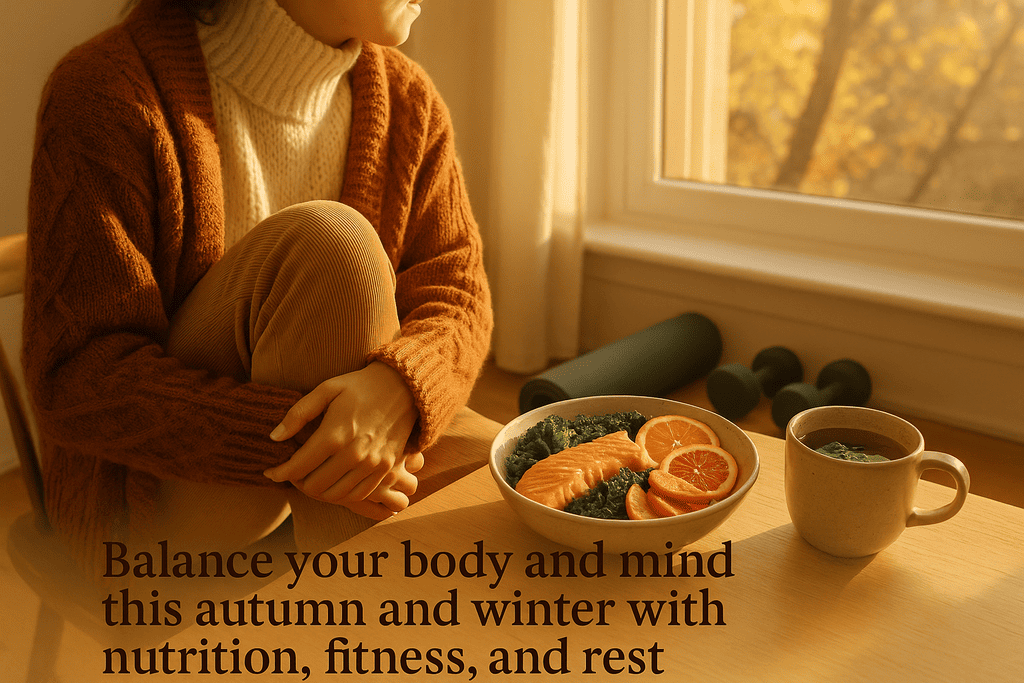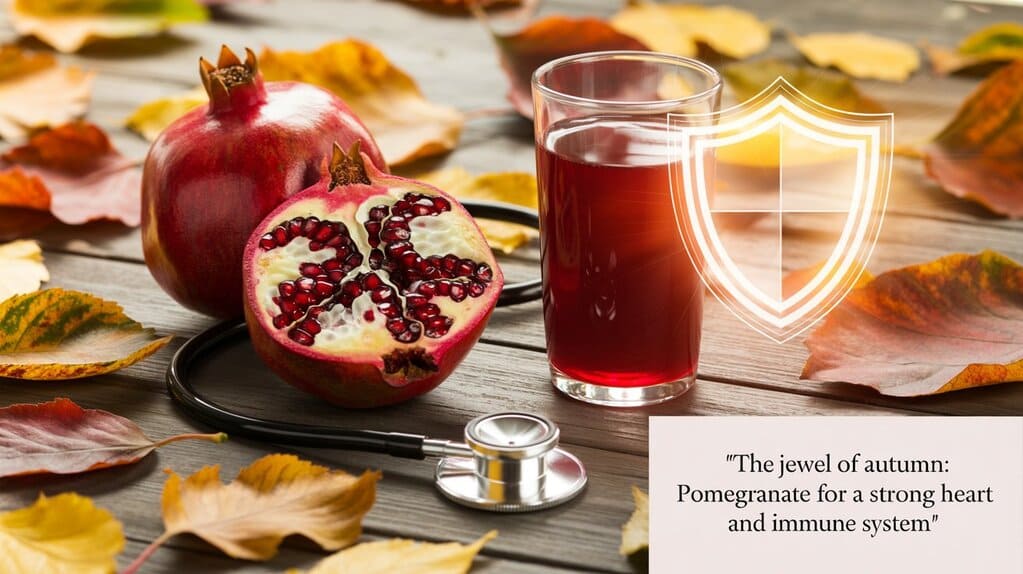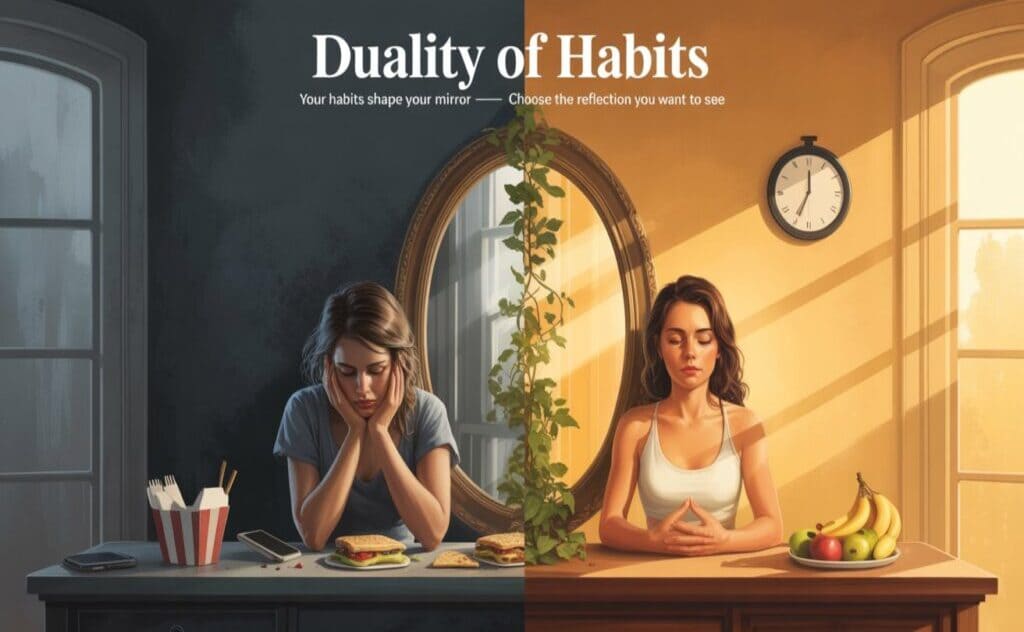
Introduction
Everyday routines add up. Small, repeated choices — sitting for hours, skipping water, scrolling late into the night, or relying on ultra-processed meals — slowly reshape your health, skin, hair, and mental well-being. Recognizing which daily habits are quietly harmful is the first step toward positive change. This article breaks down the most common damaging habits, summarizes the science behind each, and gives clear, practical solutions you can start using today. Key SEO phrases you’ll find repeated and optimized for discoverability include sedentary lifestyle, dehydration effects, sleep deprivation, processed food risks, sun protection, hair heat damage, digital detox, and mindfulness for stress.
Key Points (at-a-glance)
- Prolonged sitting increases the risk of chronic disease even in people who exercise regularly. ACP Journals
- Mild dehydration impairs mood, attention, and cognitive performance. Journal of Nutrition+1
- Sleep deprivation harms memory consolidation, immune function, and metabolic health. PubMed+1
- Frequent consumption of ultra-processed foods is linked to higher risks of cardiovascular disease and mortality. BMJ+1
- Sun protection and daily sunscreen reduce the risk of skin cancer and premature aging. The Skin Cancer Foundation+1
- Mindfulness and meditation programs have measurable benefits for stress, anxiety, and mood. JAMA Network
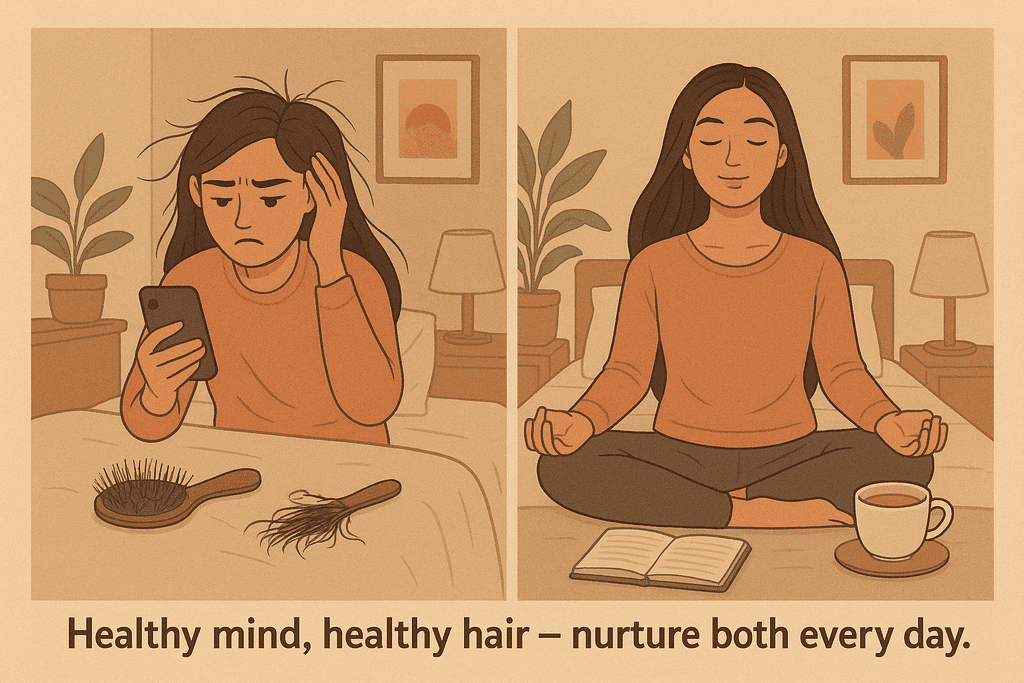
The Body — Habits, Harms, and Practical Fixes
I. Habits That Damage Physical Health
1. Prolonged sitting — the hidden cardiovascular and metabolic risk
The harm: Sitting for long, uninterrupted periods is associated with higher rates of cardiovascular disease, cancer, and all-cause mortality compared to less sedentary lifestyles. These risks exist even after accounting for exercise, which means long sitting times are an independent risk factor. ACP Journals+1
Why this matters: Extended sedentary time negatively affects blood flow, glucose metabolism, and inflammatory markers — physiologic pathways that promote disease over years.
How to fix it (practical):
- Use the 20–8–2 rule where feasible: for every 30–40 minutes sitting, stand for 8 minutes and move for 2.
- Invest in a height-adjustable desk or set phone timers to stand every 45–60 minutes.
- Break sitting into shorter blocks: short walks, stair climbs, or light stretching.
2. Not drinking enough water — small deficit, big impact
The harm: Even mild dehydration (loss of ~1–2% body weight) can impair mood, attention, and certain types of cognitive performance. Studies in both men and women show measurable decreases in vigor and increases in fatigue when hydration is inadequate. Journal of Nutrition+2PubMed+2
How to fix it (practical):
- Keep a refillable bottle in sight and sip regularly.
- Add citrus, cucumber, or mint to make water more appealing.
- Monitor urine color (pale straw color = usually well hydrated).
3. Chronic sleep restriction — the brain and body toll
The harm: Short or poor-quality sleep disrupts memory consolidation, weakens immune responses, worsens mood, and increases long-term risk for metabolic disorders. Even one night of sleep loss impairs hippocampal function and learning. PubMed+1
How to fix it (practical):
- Set a consistent sleep schedule (same bedtime and wake time daily).
- Create a wind-down routine: dim lights, stop intense screen use 60–90 minutes before bed, and use calming activities (reading, gentle stretching).
- Keep the bedroom cool, dark, and quiet.
4. Over-reliance on fast or ultra-processed foods
The harm: Diets high in ultra-processed foods (ready meals, sugary cereals, processed snacks) are associated with elevated risks of cardiovascular disease and higher all-cause mortality in large prospective studies. These foods are often energy-dense, high in added sugars, salt, and low in nutrient density. BMJ+1
How to fix it (practical):
- Cook simple whole-food meals at home: lean protein, whole grains, vegetables, and healthy fats.
- Read labels: prioritize foods with short ingredient lists and recognizable items.
- Use meal prep windows to prepare healthy, grab-and-go options.
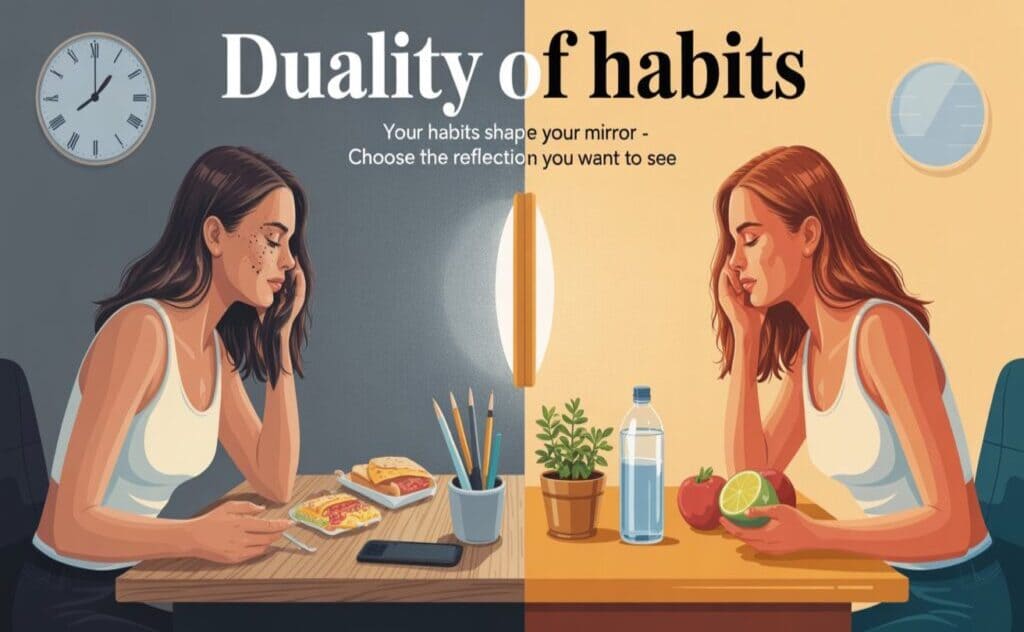
II. Habits That Damage Skin Health
1. Skipping nightly cleansing and moisturizing
The harm: Failing to remove makeup and pollutants at night blocks pores and can trigger acne and irritation. Over time, poor skin care accelerates visible aging and unevenness.
How to fix it (practical):
- Use a gentle cleanser tailored to your skin type. Double-cleanse if you wear heavy makeup or SPF.
- Finish with a suitable moisturizer and, in the morning, a broad-spectrum sunscreen.
2. Using unverified or counterfeit skincare products
The harm: Low-quality or counterfeit cosmetics can contain irritant preservatives, heavy metals, or mislabeled actives that provoke allergic reactions and long-term damage.
How to fix it (practical):
- Buy from reputable sellers, check expiration dates, and verify ingredient lists.
- Patch test new products before full facial application.
3. Excessive sun exposure without protection
The harm: Ultraviolet radiation (UVA and UVB) damages DNA in skin cells, causes pigmentation and wrinkles, and markedly increases the risk of both non-melanoma and melanoma skin cancers. Regular sunscreen use (SPF 15+ daily) lowers the risk of squamous cell carcinoma and contributes to melanoma risk reduction. The Skin Cancer Foundation+1
How to fix it (practical):
- Apply broad-spectrum sunscreen (SPF 30 recommended) daily and reapply every two hours when outdoors.
- Wear hats, sunglasses, and seek shade during peak UV hours.

III. Habits That Damage Hair Health
1. Daily hot showers and washing with very hot water
The harm: Frequent washing with hot water strips scalp oils and leaves hair dry, brittle, and prone to breakage.
How to fix it (practical):
- Wash with lukewarm water and reduce wash frequency to 2–3 times per week for most hair types.
- Use sulfate-free shampoos and deep-conditioning masks periodically.
2. Excessive heat styling
The harm: Repeated exposure to high temperatures (straighteners, curling irons) causes cumulative protein damage, split ends, and weakened hair shafts.
How to fix it (practical):
- Use a heat protectant spray prior to styling.
- Limit high-heat styling to special occasions and give hair heat-free recovery days.
3. Ignoring split ends and irregular trims
The harm: Untrimmed split ends travel up the hair shaft and make hair appear unhealthy; they can impede perceived growth.
How to fix it (practical):
- Trim every 6–8 weeks to remove split ends and maintain healthy ends.

IV. Habits That Damage Mood and Cognitive Health
1. Excessive screen time and evening blue-light exposure
The harm: Nighttime exposure to blue light from devices suppresses melatonin, delays sleep onset, and degrades sleep quality — a known pathway to poor mood and cognitive performance. Harvard Health outlines how evening blue light shifts circadian rhythms and suppresses melatonin. Harvard Health+1
How to fix it (practical):
- Implement a digital curfew: stop device use 60–90 minutes before bedtime.
- Use “night mode” or blue-light filters in the evening and enable Do Not Disturb.
2. Persistent negative thinking and unmanaged stress
The harm: Chronic stress and rumination increase the risk of anxiety, depression, and worsen physical health markers (sleep, immunity, digestion).
How to fix it (practical):
- Adopt a short daily mindfulness or breathing practice. A major meta-analysis shows mindfulness programs reduce anxiety, depression, and stress with meaningful effect sizes. JAMA Network
- Schedule social time and physical activity — both powerful stress buffers.
Table — Quick Habit Fix Cheat Sheet
| Habit | Short-term effect | Long-term risk | Simple daily fix |
|---|---|---|---|
| Sitting long hours | Stiffness, fatigue | Heart disease, mortality. ACP Journals | Break sitting every 45–60 min; standing desk |
| Low water intake | Headache, low focus | Chronic fatigue, skin dryness. Cambridge University Press & Assessment | Carry water; flavor it; monitor urine color |
| Poor sleep | Forgetfulness, irritability | Diabetes, immune impairment. PubMed | Consistent bedtime; screen curfew |
| Fast/ultra-processed food | Cravings, weight gain | Cardiovascular disease, higher mortality. BMJ | Cook simple whole foods; read labels |
| Skipping sunscreen | Sunburn, pigmentation | Skin cancer, premature aging. The Skin Cancer Foundation | Daily SPF 30+, reapply outdoors |
Scientific Voices and Global Perspectives
The harmful effects described above are supported by large meta-analyses and prospective cohort studies from researchers across Europe, North America, and beyond. Notable voices include the 2015 meta-analysis on sedentary time and disease risk, hydration and cognitive research by Lawrence E. Armstrong (USA), sleep neuroscience work such as that summarized by Matthew Walker (UK), and large population nutrition studies from European cohorts linking ultra-processed foods to higher disease risk. BMJ+3ACP Journals+3Journal of Nutrition+3
Conclusion
Small daily decisions compound into major long-term outcomes. By addressing the core habits described here — reducing prolonged sitting, staying hydrated, prioritizing sleep, choosing whole foods, protecting skin from UV, reducing heat styling on hair, and managing digital and mental load — you can protect and restore your health, skin, hair, and mood. Start with modest, consistent changes: replace one ultra-processed meal per day with a whole-food alternative, take three 5-minute movement breaks during work, and enforce a device curfew each evening. Those small steps will translate into measurable benefits over weeks and months.
References (selected)
- Biswas A., et al. “Sedentary Time and Its Association With Risk for Disease Incidence, Mortality, and Hospitalization in Adults.” Annals of Internal Medicine 2015. ACP Journals+1
- Ganio M. S., Armstrong L. E., et al. “Mild Dehydration Impairs Cognitive Performance and Mood.” Medicine & Science in Sports & Exercise (2011) and Armstrong L. E. “Mild Dehydration Affects Mood in Healthy Young Women” (2012). PubMed+1
- Walker M. P. “Cognitive consequences of sleep and sleep loss.” Annals of the New York Academy of Sciences / related reviews and “Why We Sleep” summaries. PubMed+1
- Rico-Campà A., Srour B., et al. “Association between consumption of ultra-processed foods and all-cause mortality / cardiovascular risk.” The BMJ (2019) and related NutriNet-Santé publications. BMJ+1
- Sander M., et al. “The efficacy and safety of sunscreen use for the prevention of skin cancer.” Dermatology reviews (2020). Skin Cancer Foundation resources on sun protection. PMC+1
- Goyal M., et al. “Meditation Programs for Psychological Stress and Well-being: A Systematic Review and Meta-analysis.” JAMA Internal Medicine (2014). JAMA Network
- Harvard Health Publishing. “Blue light has a dark side.” (Blue light, screen time, and sleep effects). Harvard Health+1


